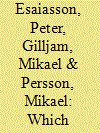| Srl | Item |
| 1 |
ID:
134414


|
|
|
|
|
| Summary/Abstract |
This article focuses on the growth and transformation of the movement against the expansion of science parks and electronics hazards in Taiwan. The author finds that the movement has brought about a strong overall trend against the industry’s expansion and has gradually raised significant concern for environmental justice in the past decade. Concern for environmental and social justice has been interwoven to frame the movement’s discourse and actions in the following three aspects: first, campaigning for procedural justice, democratic decision-making, and information transparency; second, campaigning for distributive justice of land, water, and environmental risk; and third, campaigning for the right of recognition.
|
|
|
|
|
|
|
|
|
|
|
|
|
|
|
|
| 2 |
ID:
112639


|
|
|
|
|
| Publication |
Beijing, Foreign Languages Press Co. Ltd., 2011.
|
| Description |
191p.
|
| Standard Number |
9787119070179
|
|
|
|
|
|
|
|
|
|
|
|
Copies: C:1/I:0,R:0,Q:0
Circulation
| Accession# | Call# | Current Location | Status | Policy | Location |
| 056465 | 324.2170951/JUN 056465 | Main | On Shelf | General | |
|
|
|
|
| 3 |
ID:
118531


|
|
|
|
|
| Publication |
2012.
|
| Summary/Abstract |
How can democracies satisfy citizens' demands for legitimate decision making? This article reports findings from a randomised field experiment designed to mimic decision making in large-scale democracies. Natural collectives of individuals with a shared history and future (high school classes) were studied. They were asked to make a decision about how to spend a sum of money under arrangements imposed by the researchers and distributed randomly across classes. Within this setting, empirical support for three ideas about legitimacy enhancing decision-making arrangements is tested: participatory constitution-making; personal involvement in the decision-making process; and fairness in the implementation of arrangements. Throughout the analyses it was found that personal involvement is the main factor generating legitimacy beliefs.
|
|
|
|
|
|
|
|
|
|
|
|
|
|
|
|